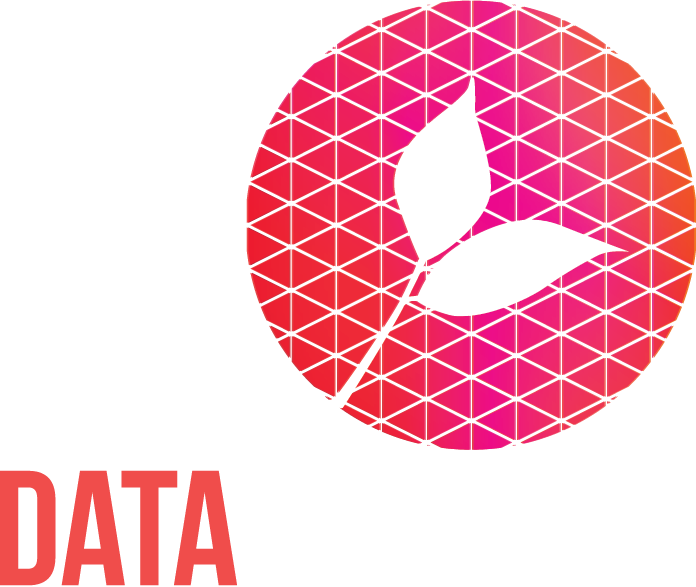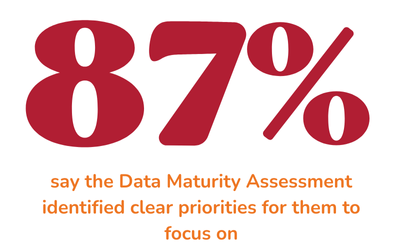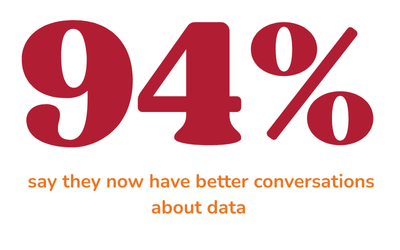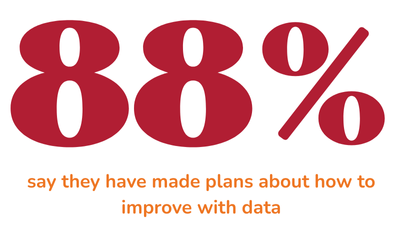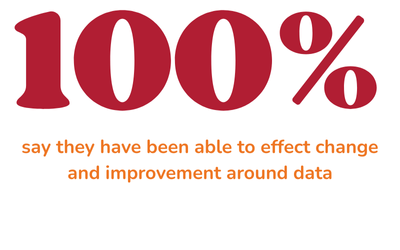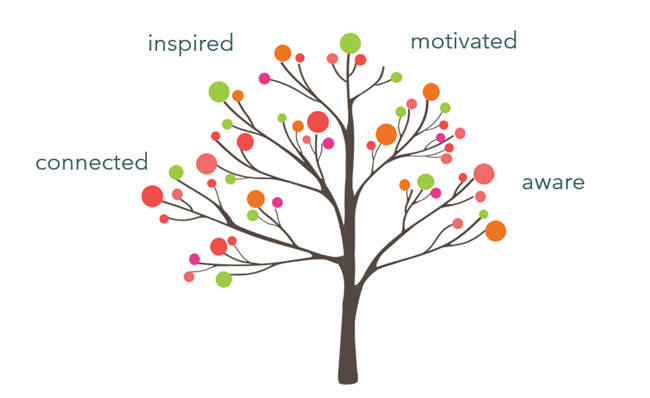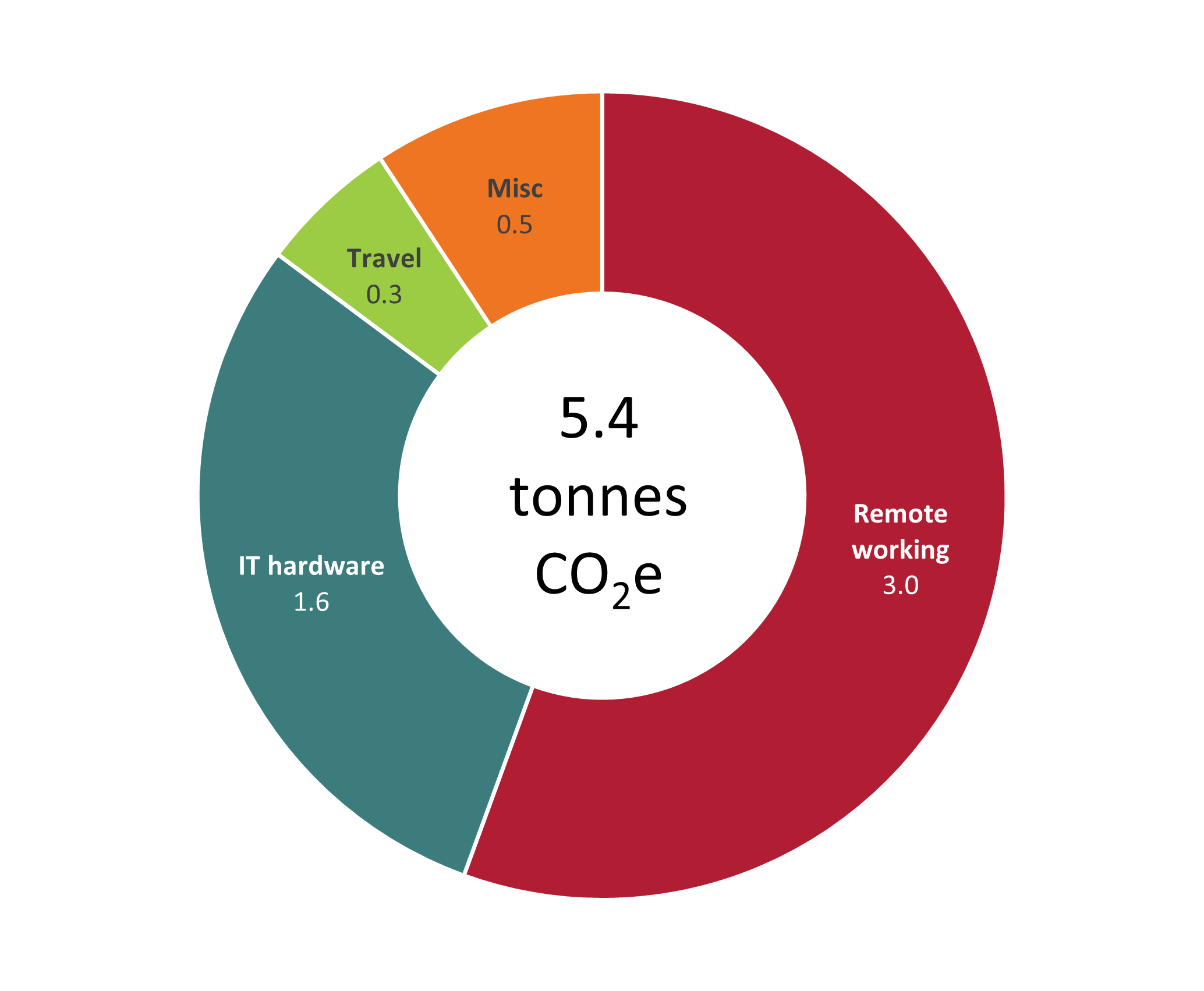Our impact
Since Data Orchard was set up in 2013, we’ve helped thousands of organisations get better with data. Our focus is on serving leaders, data strategists and champions who have responsibility for data and advocate for organisational improvement.
Ultimately, we want every nonprofit organisation to be able to use data effectively to achieve their goals.
Last updated September 2025
How we measure our impact
The outcomes we seek to measure are set out in our Theory for Change and vary depending on the nature of the products and services we provide.
Our immediate impact includes outcomes that we can directly attribute to our work. We measure this impact in multiple ways, including:
feedback from users of our data maturity assessment tool
feedback from clients at the end of our consultancy projects
questionnaires before, during and after our training courses
feedback from attendees of our events.
Many changes will happen in the early years after we have worked with clients. Importantly, these are changes that organisations make for themselves. They need effort and investment of resources to come to fruition; we can influence this change, but we are not directly accountable for it. We measure our medium-term impact through:
feedback sought 6-12 months after completing projects or training courses
in-depth case studies.
In the long term, we hope that short- and medium-term changes will become embedded in the organisations we work with, resulting in long-term transformation. We assess long-term impact through:
our nonprofit sector data jobs analysis.
Building organisations’ data skills and capabilities
Our Data Maturity Assessment tool
We engage, educate and motivate people to improve with data in their organisations through our online Data Maturity Assessment tool. Of those who provided feedback on the tool in 2024-25 (26 respondents):
91% say it improved their understanding about important factors and questions around data
87% say that it identified clear priorities for them to focus on
83% say they have increased motivation to improve their organisation’s data maturity.
Many say they have gone on to discuss with colleagues where change and improvement was needed (91%) and use the assessment results to guide plans for developing data strategy/maturity (61%). Some used the data maturity assessment as a springboard to secure leadership support for change and improvement (30%). Others applied for external funding to implement improvements (22%) and/or sought funding/resources from internal budgets to implement improvements (17%). The majority were successful in securing this funding and used it for consultancy/external support, new roles/responsibilities for existing staff, training, new tools, and new jobs.
Of those who developed a new plan or strategy, around two-thirds say they were able to:
improve their impact, services or products
make efficiency savings (resources, processes, service/product delivery)
strengthen partnerships/networks and increase credibility.
Our consultancy services
As a social enterprise, we generate almost all our income through trading our products and services. We typically work on 30-40 projects with clients each year; all statistics in this section are based on feedback from 20 clients in 2024-25. Our clients include charities, social enterprises, social housing providers, and public sector organisations working in diverse fields such as poverty and disadvantage, health and wellbeing, government, homelessness, children and young people, unemployment, environment, volunteering, arts and culture, animals, transport.
Our capacity building work with clients has resulted in organisations improving their shared understanding of how well they are doing with data and having better conversations about data among staff:
94% say they have an improved shared understanding about data in the organisation.
94% say they have better conversations about data among staff
93% say they have a better understanding of how they are doing with data
“It has helped to shine a light on how important it is for the organisation to invest in data as an asset. We have established a Data Governance group with senior leadership as participants ensuring that data is being prioritised.”
They have also seen improvements in the data itself and their collection, management, analysis and reporting processes:
75% say they have improved data analysis and reporting processes
75% say they have improved processes for data collection.
70% say they have better quality data
“The recommendations provided us strong backing to carry out important projects involving our data assets, data standards and data quality. We had known some of the issues that have been highlighted, and the report gives us the evidence we need to get senior management buy-in and support.”
Our work has also helped organisations to think strategically about data:
100% say they have increased knowledge about how to measure impact.
88% say they have made plans about how to improve with data
86% say they have an increased understanding of gaps in skills and roles
80% say they have an improved definition of the data they need
“We are now rolling out four data skills workshops that have been personalised to meet our needs and the needs of our staff. They have been met with fantastic feedback and we’re already seeing examples of staff using the skills they’ve learnt in their daily jobs, specific projects and setting goals and objectives.”
Organisations are most likely to use the work we completed with them to inform future planning and strategy (83%), evidence impact (61%), and secure data resources such as new roles, training or consultancy (61%).
Our training courses
We offer in-house and open training courses to suit our clients’ needs. Our primary offer is our Data for Leaders course, which we run twice a year as an open course, as well as in-house for large organisations and networks. We’ve had feedback from 39 of 61 attendees upon completion of the course. Of these:
95% say they have a good overview of what they need to know about data in their organisation
95% say they have a better understanding of how well their organisation is doing with data
92% say they have a better understanding about different areas of data expertise and roles
90% say they feel confident to lead better conversations about data in their organisation
79% say they feel equipped to make better investment decisions around data infrastructure, skills and staffing.
As well as immediate post-course feedback, we’ve also followed up with organisations 6-12 months following completion of the course to assess enduring impact. We’ve had feedback from 10 of 24 organisations invited to provide longer-term feedback. Of these:
100% say they have been able to effect change and improvement around data in their organisation since completing the course
90% say they have been able to lead better conversations about data
70% say they have been able to mobilise support/leadership buy-in to improve with data
50% say they have been able to develop/implement a new data strategy or approach
40% say they have been able to secure investment in data-related resources and/or implement data improvement projects
“We gathered data stories from the team using the model that you shared with us which enabled us to identify quick, medium and long-term data needs. We’ve addressed most, if not all, the short term ones as well as some of the mid and long.”
“I am encouraged that the executive team have identified data and insight as a corporate-wide undertaking rather than the responsibility of one or two departments... We are just starting our journey, and I will be referring back to the course materials as we go.”
“We have a clearer vision of what we need to do to achieve our data goals based around the data maturity framework. I wouldn’t call this a data strategy yet, but we will get there soon. This vision helped us to secure support and investment in the team.”
“I found the skills matrix particularly useful in understanding the skills we need to meet our data ambitions and how our current roles were creating barriers and leading to stress for the people in them. As a result we’ve had a bit of a restructure and changed some roles, created a progression pathway. We were lucky enough to identify some resources to create a couple of new roles too.”
“As myself and the Chief Executive completed this course, it has given us both a much more considered view of the importance of good data and an appropriate culture. We have had richer conversations and have a joined up approach.”
Promoting the importance and value of data for good
Sharing knowledge and building communities
Each year we reach thousands of people through our championing activities: our learning and networking events, newsletter, tools and resources. Our evaluations show these activities, which we provide almost entirely free of charge, deliver four key outcomes. People who attended our events in 2024-25 (74 respondents) told us they felt:
inspired about the possibilities for using data in their organisation (72% agreed)
motivated to improve with data in their organisation (75% agreed)
more aware of useful resources and good practice (69% agreed)
more connected to professional peers and support (74% agreed).
Our Nonprofit Datafolk Club is particularly popular with over 250 data professionals in our community. Each month 20-40 people meet up to chew over hot data topics. Attendees tell us:
“It's a great opportunity to meet and share with others in the charity sector. The discussion topics are always interesting and give a chance to learn and inform in equal measure.”
“It's useful to hear about solutions similar organisations have found for problems we're trying to tackle. The practical focus means I almost always have something to take away and explore in my own work.”
“[I] find these events really useful - great opportunity to talk to other people working with data, and compare challenges/ideas/notes etc. Makes me feel less alone!”
“I always come out of these workshops with new ideas and different things to try in my organisation.”
“For small organisations it's such a great way to connect with other data people, as we often work in isolation, so being able to exchange ideas with others can be tricky.”
Building new evidence about data across sectors
We began our pioneering research on organisational data maturity in 2015. Our data maturity assessment and benchmarking tool, launched in 2019, was the first of its kind, and provides a robust evidence base for the changing needs and challenges around data for organisations and sectors.
Our annual State of the Sector data maturity reports bring together data from thousands of users of our tool to provide a unique and increasingly robust benchmark of the changing state of data maturity in the nonprofit sector. They have been used to raise awareness of sector needs amongst policymakers, grant-makers, and infrastructure organisations.
We also recently expanded our research portfolio to include regular analysis of the data jobs market in the nonprofit sector, including salary benchmarking and monitoring changing trends. Read our latest nonprofit job market analysis.
Making a difference in the public sector
Our work has had a direct influence on advancing data maturity in governments.
UK Government: In 2023, the Central Digital and Data Office published the UK Government’s data maturity framework which was derived from Data Orchard’s data maturity framework. It is testament to the quality and value of our research and model, and our openness in freely sharing this, that our influence has been recognised.
Scottish Government: Since 2021, we’ve supported Scottish Government in providing data maturity assessment services to more than 40 public sector organisations of different shapes and sizes. The learning and experience has contributed towards a fully-funded public sector Data Maturity Programme and the creation of a cross-sector Vision for Public Data in Scotland led by Scottish Government. You can read more about our work with Scottish Government here.
Welsh Government: We’ve worked together with Data Cymru, a Welsh local government company that supports local councils with data, to translate the training materials published by MIT’s DataBasic project into the Welsh language and tailor them to the Welsh context.
We supported Data Cymru to deliver the new DataBasic Cymru workshops for staff at the Senedd (Welsh Parliament). Our Mapio Cymru project works to provide mapping services in Welsh that are as good as they are in English.
In 2019 we published openstreetmap.cymru, the most comprehensive map of Wales that only uses Welsh language names for places and features. We’ve been maintaining and improving this ever since with funding support from Welsh Government, who we provide with a Welsh-language only basemap for use in their Data Map Wales service. We also provide our map tiles to mySociety for a Welsh language version of FixMyStreet.
Environmental impact
As Data Orchard is a remote online business, our company’s carbon footprint is largely a result of ‘indirect’ emissions that occur as a consequence of our activities, such as our use of energy whilst working at home or in a co-working space; business travel; IT hardware; waste disposal; and data storage.
Overall, we estimate that Data Orchard’s annual carbon footprint is around 5.4 tonnes CO2 equivalent. As a point for comparison, the average per person annual carbon footprint in the UK is 10 tonnes.
The bulk of this results from the lighting, heating and workstation energy use associated with our activities and the lifecycle of our IT hardware. We do also travel for meetings, events and some client project delivery. For this we prioritise public travel, particularly by train, and this accounts for a small proportion of our emissions. We also include 0.5 tonnes of wriggle room to account for things we might have missed or underestimated. You can read more about how we calculated our carbon footprint here.
To mitigate for our unavoidable carbon emissions, we choose to contribute towards two carbon reduction and biodiversity restoration schemes per strategic period – one here in the UK, and an international scheme, recognising the global nature of carbon emissions and biodiversity loss. When doing our research we keep our values at the forefront. We look for opportunities that provided broader social as well as environmental benefits.
We currently support Trees for Cities and Cool Earth. Trees for Cities have planted more than 1.8 million trees to date, engaging more than 9,500 people in the promotion of urban trees and over 26,700 pupils in school programmes. Cool Earth supports more than 40 projects which cover 2.1 million acres of tropical forest, containing over 380 million trees and storing 500 million tonnes of carbon.
We also work to minimise the impact of our data storage by making sure we keep things tidy and get rid of data we no longer need during regular Data Cleaning Days.
More about our impact
Each year we report on our social and community benefit to our regulators at the UK Government’s Companies House. Read our 2024-25 social and community benefit report.
